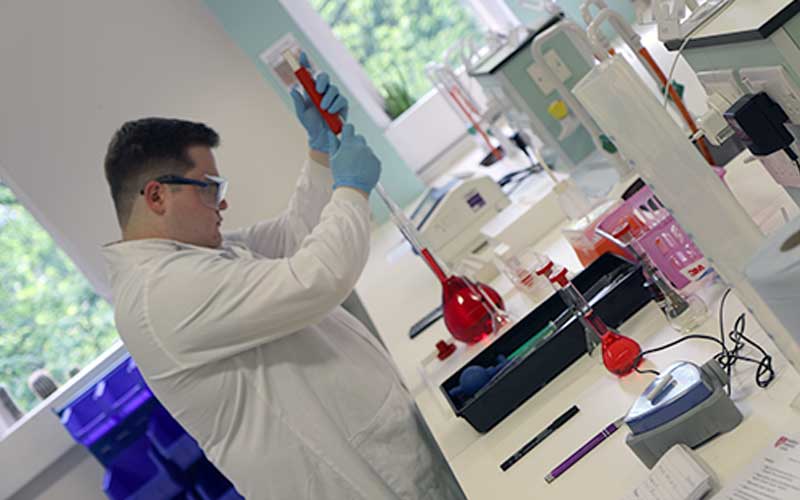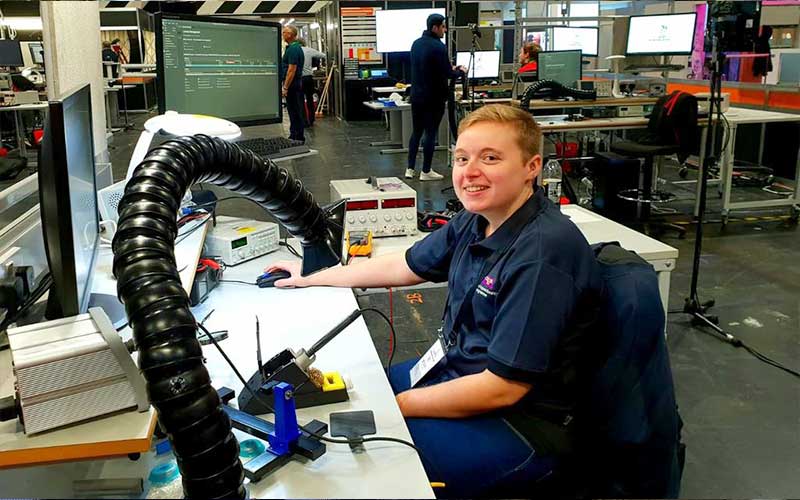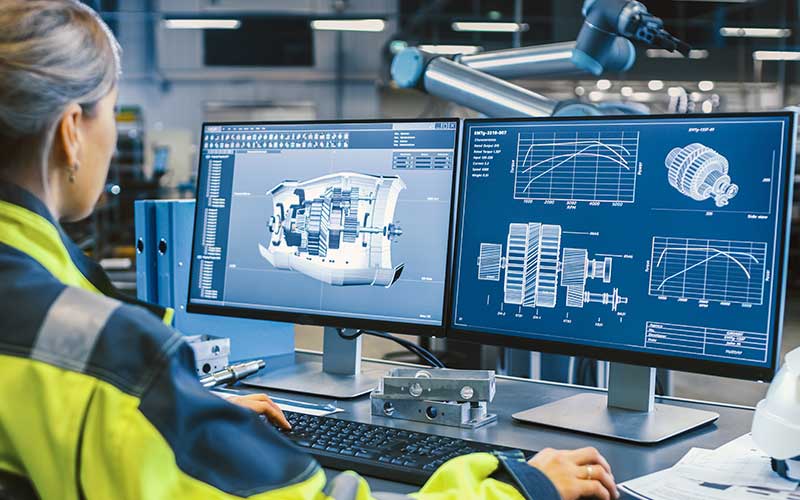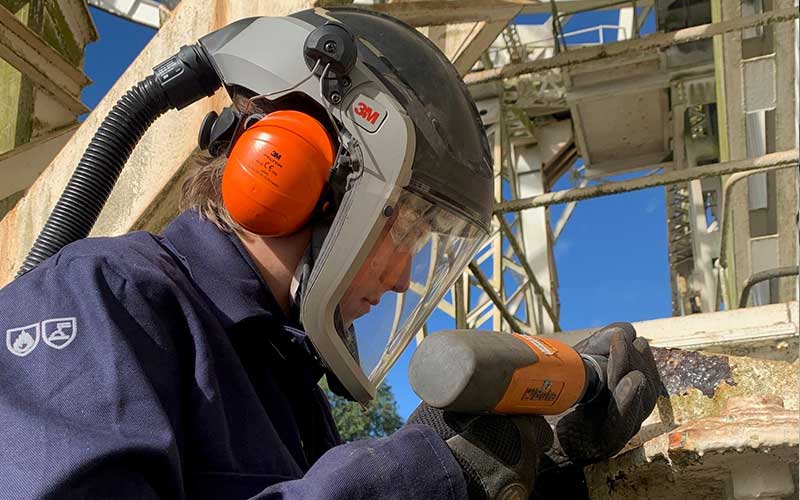Programmes
Join our research, teaching and learning support teams to acquire new skills while continuing your education.
An apprenticeship is a real job that allows you to train and develop new skills while working and earning a salary. By becoming an apprentice at The University of Manchester you will train with some of the best academic and technical staff, specialise into an area based on your interests and get workplace experience that will kick-start your career.
Technical apprenticeships (*levels 2-7)
We have five apprenticeship programmes currently available, find out more about each of them below.
Apprentice Laboratory Technician

An apprenticeship at The University of Manchester provides you with the necessary transferable skills that allow you to develop a rewarding career as a specialist laboratory support technician. Throughout your training you will receive expert instruction from senior laboratory staff and managers that will allow you to independently undertake key chemical procedures, and prepare a broad range of geological and biological materials used in research by the Faculty of Science and Engineering.
You will also learn skills in business administration, procurement, policy and procedures and finance.
Scope of the apprenticeship
You will receive detailed instruction on how to successfully operate a lab within a busy and dynamic Faculty.
Specifically, your training focuses on (but is not limited to) the following areas:
- General laboratory housekeeping, including cleaning, monitoring and maintenance
- Preparation of solutions, samples and standards for instrumental analysis
- Drying and sieving of rock, soil, sediment and other samples in preparation for further analysis
- Acid/base and other titrations for the determination of species concentration and key reaction end-points
- Operation of an advanced microwave digestion system and other instrumentation for preparation of samples prior to analysis
- Calibration of key instrumentation including; pH, conductivity and redox meters, for use in both the laboratory and on field trips
- The use and importance of aseptic technique, and other key principles of microbiology
- Preparation of a range sterile nutrient media used to support the growth of different microorganisms
- Culturing various organisms found in the natural environment (principally obligate anaerobes) both in aqueous media and in the presence of key mineral substrates
- The preparation of environmental samples for advanced analysis techniques used in modern Molecular Ecology, including cloning/sequencing and other genetic manipulations
- Supported by additional learning, the apprentice will develop a sound theoretical understanding and appreciation of microbiological processes including key metabolic pathways and their relevance in the natural environment
About the candidate
Required skills:
- An interest in computing and computer controlled instrumentation
- Computer literate including a good working knowledge of the MS Office suite
- A willingness to undertake further practical and theoretical training as dictated by the role
Required qualifications:
- An educational background in chemistry and/or biology (5 GCSEs at grade C or above to include English and Mathematics and Science) and/or experience of procedures and process commonly found in analytical and/or microbiological laboratories
Personal qualities:
- A keen eye for detail and a strong work-ethic
- An ability to work both independently and within a team to meet time-critical goals and targets as the role dictates
- Excellent written and oral communication skills
Training and qualifications you will receive
- Level 2 Certificate in Laboratory and Associated Technical Activities.
- BTEC Level 2 Diploma in Applied Science.
- Functional skills at Level 1 in Mathematics, English and Information and Computer Technology ( if required).
- Employee Rights and Responsibilities.
- Personal Learning and Thinking Skills.
Apprentice Engineering Technician
The apprenticeship programme provides you with a transferable skill set that lets you develop a rewarding career as a specialist engineering support technician. The programme covers a broad range of skills and topics that gives you a solid foundation upon which to build your career.
After a short orientation programme, you will take part in a block release of around 24 weeks at Trafford College where they will equip you with all the necessary hands-on skills you'll need to safely transition into the workplace.
While working at the University you will be provided with instruction, information and training from senior workshop staff and managers so that you can work independently and competently on key workshop procedures that support our research. Alongside your practical training, you will be taught the necessary skills of business administration including; procurement, policy and procedures, and finance.
Scope of the apprenticeship
You will receive detailed instruction, information and training for the key aspects of successful workshop operation within a busy and dynamic setting within the Faculty of Science and Engineering.
Specifically, the initial training offered will focus on (but not be limited to) the following areas:
- General workshop housekeeping, including cleaning, monitoring and maintenance
- Working safely in an engineering environment
- Using and communicating technical information
- Carrying out engineering activities efficiently and effectively
- Producing mechanical engineering drawings using a CAD system
- Producing components using hand fitting techniques
- Preparing and using lathes for turning operations
- Preparing and using milling machines
- Assembling and testing electronic circuits
Additional, specialised training will be available to candidates who have shown specific interest or ability in mechanical or electronic engineering.
About the candidate
Required skills:
- An interest in computing and computer controlled instrumentation.
- Computer literate including a good working knowledge of the MS Office suite.
- A willingness to undertake further practical and theoretical training as dictated by the role.
Required qualifications:
- An educational background in science (5 GCSEs to include Mathematics and English at grade C or above) and/or experience of procedures and process commonly found in a workshop environment.
Personal qualities:
- A keen eye for detail and a strong work-ethic.
- An ability to work both independently and within a team to meet time-critical goals and targets as the role dictates.
- Excellent communication skills (both written and oral).
Training and qualifications you will receive
- Level 2 NVQ Diploma in Performing Engineering Operations.
- BTEC Level 2 Diploma in Engineering.
- Functional skills at Level 1 in Mathematics, English and Information and Computer Technology ( if required).
- Employee Rights and Responsibilities.
- Personal Learning and Thinking Skills.
Apprentice Electrical Electronic Engineering Technician

Electrical Electronic Engineer (EEE) is a skill used in a variety of job roles ranging in duties surrounding electronics. Some of these include the design of electronic circuit boards, research related design and manufacture, fault finding and diagnosis, maintenance and a myriad of other expertise. As an Apprentice you will receive detailed instruction, information and training surrounding many key aspects pivotal to the successful implementation of electronics work within busy, dynamic workshops, based within the Faculty of Science & Engineering. Training opportunities include, Electrical and Electronic principles, programming, applications of electronic devices and circuits plus much more, gaining a vast skill set across many areas of electronics.
Aim of the apprenticeship
The apprenticeship programme provides you with a transferable skill set that lets you develop a rewarding career as a specialist engineering support technician. The programme covers a broad range of skills and topics that gives you a solid foundation upon which to build your career.
After a short orientation programme, you will take part in a block release of around 24 weeks at Trafford College where they will equip you with all the necessary hands-on skills you'll need to safely transition into the workplace.
While working at the University you will be provided with instruction, information and training from senior workshop staff and managers so that you can work independently and competently on key workshop procedures that support our research. Alongside your practical training, you will be taught the necessary skills of business administration including; procurement, policy and procedures, and finance.
Scope of the apprenticeship
You will receive detailed instruction, information and training for the key aspects of successful workshop operation within a busy and dynamic setting within the Faculty of Science and Engineering.
Specifically, the initial training offered will focus on (but not be limited to) the following areas:
- General workshop housekeeping, including cleaning, monitoring and maintenance
- Working safely in an engineering environment
- Using and communicating technical information
- Carrying out engineering activities efficiently and effectively
- Producing mechanical engineering drawings using a CAD system
- Producing components using hand fitting techniques
- Preparing and using lathes for turning operations
- Preparing and using milling machines
- Assembling and testing electronic circuits
Additional, specialised training will be available to candidates who have shown specific interest or ability in mechanical or electronic engineering.
About the candidate
Required skills:
- An interest in computing and computer controlled instrumentation.
- Computer literate including a good working knowledge of the MS Office suite.
- A willingness to undertake further practical and theoretical training as dictated by the role.
Required qualifications:
- An educational background in science (5 GCSEs to include Mathematics and English at grade C or above) and/or experience of procedures and process commonly found in a workshop environment.
Personal qualities:
- A keen eye for detail and a strong work-ethic.
- An ability to work both independently and within a team to meet time-critical goals and targets as the role dictates.
- Excellent communication skills (both written and oral).
Training and qualifications you will receive
- Level 2 NVQ Diploma in Performing Engineering Operations.
- BTEC Level 2 Diploma in Engineering.
- Functional skills at Level 1 in Mathematics, English and Information and Computer Technology ( if required).
- Employee Rights and Responsibilities.
- Personal Learning and Thinking Skills.
Apprentice Building Services Technician

Building Services Technician (BST) has a wide remit of duties and responsibility. The primary role of a Building Services Operative is to optimise property condition to ensure the building is kept in a safe working condition. Building Services Operatives need to maintain a high level of quality, providing maximum satisfaction to customers, clients, guests and the teams. They will ultimately understand the purpose and function of building systems including electrical, plumbing, plant, safety systems and equipment. They will provide first and immediate response to fault finding, while maximising quality and ensuring cost effectiveness. They will ensure prevention of major damage that could result in extensive costs and minimise reactive intervention.
Aim of the apprenticeship
The apprenticeship programme provides you with a transferable skill set that lets you develop a rewarding career as a specialist engineering support technician. The programme covers a broad range of skills and topics that gives you a solid foundation upon which to build your career.
After a short orientation programme, you will take part in a block release of around 24 weeks at Trafford College where they will equip you with all the necessary hands-on skills you'll need to safely transition into the workplace.
While working at the University you will be provided with instruction, information and training from senior workshop staff and managers so that you can work independently and competently on key workshop procedures that support our research. Alongside your practical training, you will be taught the necessary skills of business administration including; procurement, policy and procedures, and finance.
Scope of the apprenticeship
You will receive detailed instruction, information and training for the key aspects of successful workshop operation within a busy and dynamic setting within the Faculty of Science and Engineering.
Specifically, the initial training offered will focus on (but not be limited to) the following areas:
- General workshop housekeeping, including cleaning, monitoring and maintenance
- Working safely in an engineering environment
- Using and communicating technical information
- Carrying out engineering activities efficiently and effectively
- Producing mechanical engineering drawings using a CAD system
- Producing components using hand fitting techniques
- Preparing and using lathes for turning operations
- Preparing and using milling machines
- Assembling and testing electronic circuits
Additional, specialised training will be available to candidates who have shown specific interest or ability in mechanical or electronic engineering.
About the candidate
Required skills:
- An interest in computing and computer controlled instrumentation.
- Computer literate including a good working knowledge of the MS Office suite.
- A willingness to undertake further practical and theoretical training as dictated by the role.
Required qualifications:
- An educational background in science (5 GCSEs to include Mathematics and English at grade C or above) and/or experience of procedures and process commonly found in a workshop environment.
Personal qualities:
- A keen eye for detail and a strong work-ethic.
- An ability to work both independently and within a team to meet time-critical goals and targets as the role dictates.
- Excellent communication skills (both written and oral).
Training and qualifications you will receive
- Level 2 NVQ Diploma in Performing Engineering Operations.
- BTEC Level 2 Diploma in Engineering.
- Functional skills at Level 1 in Mathematics, English and Information and Computer Technology ( if required).
- Employee Rights and Responsibilities.
- Personal Learning and Thinking Skills.
Apprentice Design and Draughting Technician

Computer Aided Design (CAD) has now developed from simple CAD software to a complex multi-faceted 3D solid modelling software, used in many Engineering fields. Here at The University of Manchester you will learn to use 3D modelling software. Using trained skills you will be able to follow a design brief and carry out concept development to produce design solutions using 3D models. From the 3D models you will then produce 2D detailed manufacturing drawing plus technical illustrations to build a full data pack of an assembled piece of equipment or experimental apparatus.
Aim of the apprenticeship
The apprenticeship programme provides you with a transferable skill set that lets you develop a rewarding career as a specialist engineering support technician. The programme covers a broad range of skills and topics that gives you a solid foundation upon which to build your career.
After a short orientation programme, you will take part in a block release of around 24 weeks at Trafford College where they will equip you with all the necessary hands-on skills you'll need to safely transition into the workplace.
While working at the University you will be provided with instruction, information and training from senior workshop staff and managers so that you can work independently and competently on key workshop procedures that support our research. Alongside your practical training, you will be taught the necessary skills of business administration including; procurement, policy and procedures, and finance.
Scope of the apprenticeship
You will receive detailed instruction, information and training for the key aspects of successful workshop operation within a busy and dynamic setting within the Faculty of Science and Engineering.
Specifically, the initial training offered will focus on (but not be limited to) the following areas:
- General workshop housekeeping, including cleaning, monitoring and maintenance
- Working safely in an engineering environment
- Using and communicating technical information
- Carrying out engineering activities efficiently and effectively
- Producing mechanical engineering drawings using a CAD system
- Producing components using hand fitting techniques
- Preparing and using lathes for turning operations
- Preparing and using milling machines
- Assembling and testing electronic circuits
Additional, specialised training will be available to candidates who have shown specific interest or ability in mechanical or electronic engineering.
About the candidate
Required skills:
- An interest in computing and computer controlled instrumentation.
- Computer literate including a good working knowledge of the MS Office suite.
- A willingness to undertake further practical and theoretical training as dictated by the role.
Required qualifications:
- An educational background in science (5 GCSEs to include Mathematics and English at grade C or above) and/or experience of procedures and process commonly found in a workshop environment.
Personal qualities:
- A keen eye for detail and a strong work-ethic.
- An ability to work both independently and within a team to meet time-critical goals and targets as the role dictates.
- Excellent communication skills (both written and oral).
Training and qualifications you will receive
- Level 2 NVQ Diploma in Performing Engineering Operations.
- BTEC Level 2 Diploma in Engineering.
- Functional skills at Level 1 in Mathematics, English and Information and Computer Technology ( if required).
- Employee Rights and Responsibilities.
- Personal Learning and Thinking Skills.
Degree and higher apprenticeships
The University of Manchester is an approved training provider of degree apprenticeships and is committed to working with employers to deliver high quality apprenticeships for their employees to increase productivity and skills knowledge. Degree Apprenticeships are a combination of 80% paid employment and 20% training developed by employers, universities and professional bodies.
Apprenticeship levy
The Apprenticeship Levy is a funding system in England which aims to create 3 million new apprenticeships. Employers with an annual payroll of more than £3 million pay 0.5% of their payroll into the Apprenticeship Levy. Employers who have a pay bill of less than £3 million, any training and assessing costs are shared with the government, with employers paying 5% and the former covering the remaining 95%. This allows companies of all sizes to take advantage of the training available to them.
For apprentices
A degree apprenticeship at University of Manchester is a job combined with a university degree and will offer you the key skills, qualifications and experience required to develop your career further by combining full time paid work, on the job training and off the job funded university study.
Programmes
We currently offer apprenticeship programmes aligned to the Senior Leader standard.
For employers
Degree Apprenticeships can help employers attract and retain high-calibre employees and graduates by offering life-long learning to develop the skills and attributes needed for your organisation. We can support you to find the right programme. Your apprentice be taught by academics who are specialists in their field in a teaching through research environment.
The University of Manchester currently offer apprenticeships aligned to the Senior Leader standard. Find out more information and see how this can help you.
Safeguarding and prevent for apprentices
At The University of Manchester, we take our responsibility to ensure the safety of our staff and students seriously. This also extends to learners who are studying at the University as part of an apprenticeship programme. The university is committed to creating a safe environment for all our students and apprentices. This includes ensuring appropriate procedures are in place and a safeguarding team is accessible when necessary.
Additionally, as part of the Counter-Terrorism and Security Act 2015, universities are required to pay ‘due regard to the need to prevent individuals from being drawn into terrorism’ and forms part of the university’s Safeguarding Policy this is known as the ‘Prevent Duty’. The University’s main focus on Prevent is to emphasise the use of existing University processes providing welfare, support and advice to students and apprentices or staff.
Staff, apprentices and employers can read more about how the university is keeping our apprentices safe.
British values
The Department for Education have reinforced the need ‘to create and enforce a clear and rigorous expectation on all schools to promote the fundamental British values of democracy, the rule of law, individual liberty and mutual respect and tolerance of those with different faiths and beliefs’ as part of the Prevent Duty.
The University of Manchester is committed to upholding these values for its students and apprentices both throughout their studies and within their teaching, but also as part of their overall experience as a student/apprentice. These are demonstrated through:
- Our diverse curriculum and teaching methods including seminars and workshops to allow reflection and voicing of ideas
- Student Charter
- University Bullying and Harassment policies and procedures
- Student Wellbeing and Support policies, procedures and resources, including the counselling service and a wealth of mental health support services
- Disciplinary and IT policies and procedures
- Students Union and Alumni membership

